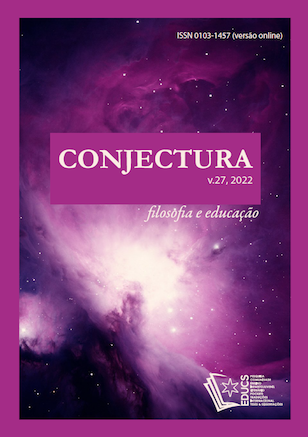A representação na esfera do teatro segundo Jean-Jacques Rousseau
DOI:
https://doi.org/10.18226/21784612.v27.e022026Resumo
Objetiva-se fazer uma breve explanação sobre a problemática da representação teatral e os seus efeitos sobre os espectadores a partir do caráter etnológico, através da crítica realizada pelo filósofo Jean-Jacques Rousseau (1712-1778). Fundamenta-se com base na obra Carta a D’Alembert sobre os espetáculos. Nesta obra, Rousseau apresenta uma crítica à representação social através do teatro francês do século XVIII. Na Carta o autor discorre toda sua crítica ao teatro francês do século XVIII e expressa as razões para não fundar uma companhia de teatro em Genebra, atribuindo aos jogos e espetáculos cívicos uma importância pedagógica em oposição aos espetáculos teatrais produzidos na época. Assim, iremos, no presente artigo, tratar sobre essa dualidade entre ser e parecer que se evidencia como um jogo de oposição entre uma sociedade corrompida pelos espetáculos teatrais e outra livre dos efeitos corruptores da cena teatral. Nessa última, o único espetáculo possível são as festas populares.
Referências
FORTES, Luís Roberto Salinas. Rousseau, teatro, a festa e Narciso. Discurso. São Paulo, 17: 13-43, 1988.
FORTES, Luís Roberto Salinas. Paradoxo do espetáculo: política e poética em Rousseau. São Paulo: Discurso Editorial, 1997.
FREITAS, Jacira de. Política e festa popular em Rousseau: a recusa da representação. São Paulo: Humanitas/FFLCH/USP, 2003.
PRADO JÚNIOR, Bento. Gênese e estrutura dos espetáculos. In____________. A retórica de Rousseau e outros ensaios. São Paulo: Cosac Naify, 2008.
ROUSSEAU, Jean-Jacques. Carta à d’Alembert sobre os espetáculos. Trad. Roberto Leal Ferreira. Campinas: Editora da UNICAMP, 1993. (Coleção Repertório).
ROUSSEAU, Jean-Jacques. Discurso sobre a origem e os fundamentos da desigualdade entre os homens. São Paulo: Abril Cultural, 1987.
STAROBINSKI, Jean. A festa. In:_____________. Jean-Jacques Rousseau: a transparência e o obstáculo; seguido de sete ensaios sobre Rousseau. Trad.Maria Lúcia Machado. São Paulo: Compania das Letras,2011.
Downloads
Publicado
Como Citar
Edição
Seção
Licença
1. A publicação dos originais implicará a cessão dos direitos autorais à revista Conjectura.
2. Os textos não poderão ser reproduzidos sem autorização da revista depois de aceitos.

Este trabalho está licenciado com uma Licença Creative Commons - Atribuição 4.0 Internacional.









